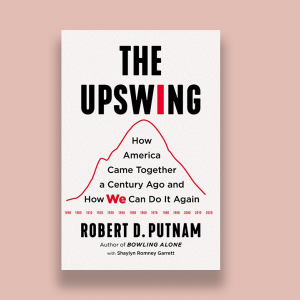Andy Singleterry is co-leader of the Servant Partners' site in San Jose, Calif., and publisher of Servant Partners Press.
Posts By This Author
How Americans Can Come Together Again
Churches can learn a lot from the Progressive Era.
IN THIS TIME of pandemic and sheltering in place, we all feel the need for community. We self-isolate to guard the health of ourselves and our friends—shunning our neighbors is, paradoxically, loving them. This cultural conundrum suits our individualistic age, and the story of how we came to this rampant individualism is told in The Upswing: How America Came Together a Century Ago and How We Can Do It Again, by Robert D. Putnam and Shaylyn Romney Garrett.
Putnam made his name 20 years ago with Bowling Alone, diagnosing America’s shrinking sense of community since the ’60s. He propagated the concept of “social capital” to name the value of our connections, to quantify our losses. Now, in The Upswing, he takes the story back further and speaks in simpler terms of “I” and “we.”
Revisiting a Comforting and Infuriating Book of Scripture
A review of “Romans Disarmed: Resisting Empire, Demanding Justice,” by Sylvia C. Keesmaat and Brian J. Walsh.
FOR MANY OF us, Romans is the most comforting and infuriating book of scripture. We rest easy in God’s grace in chapters three through five and the assurance that all will be well in chapter eight. But we chafe at chapter one’s exclusion of certain people and chapter 13’s apparent baptism of worldly power.
Sylvia C. Keesmaat and Brian J. Walsh are here to help. In their book Romans Disarmed: Resisting Empire, Demanding Justice, they read Paul’s letter through the lens of homemaking. All the discipline and love of the letter centers on God’s people making a home in the center of a home-breaking empire, and on God’s invitation to humanity to come home to God. Following the strategy of their book Colossians Remixed, Keesmaat and Walsh paraphrase passages of Romans to clarify its application to readers’ lives, and provide a fictional account of how two members of the ancient Roman congregation received the letter.
Wait a minute. They include fiction in nonfiction?
Yes, and here’s the most noticeable interpretive move they make: inserting questions and comments from an artificial, skeptical dialogue partner.

